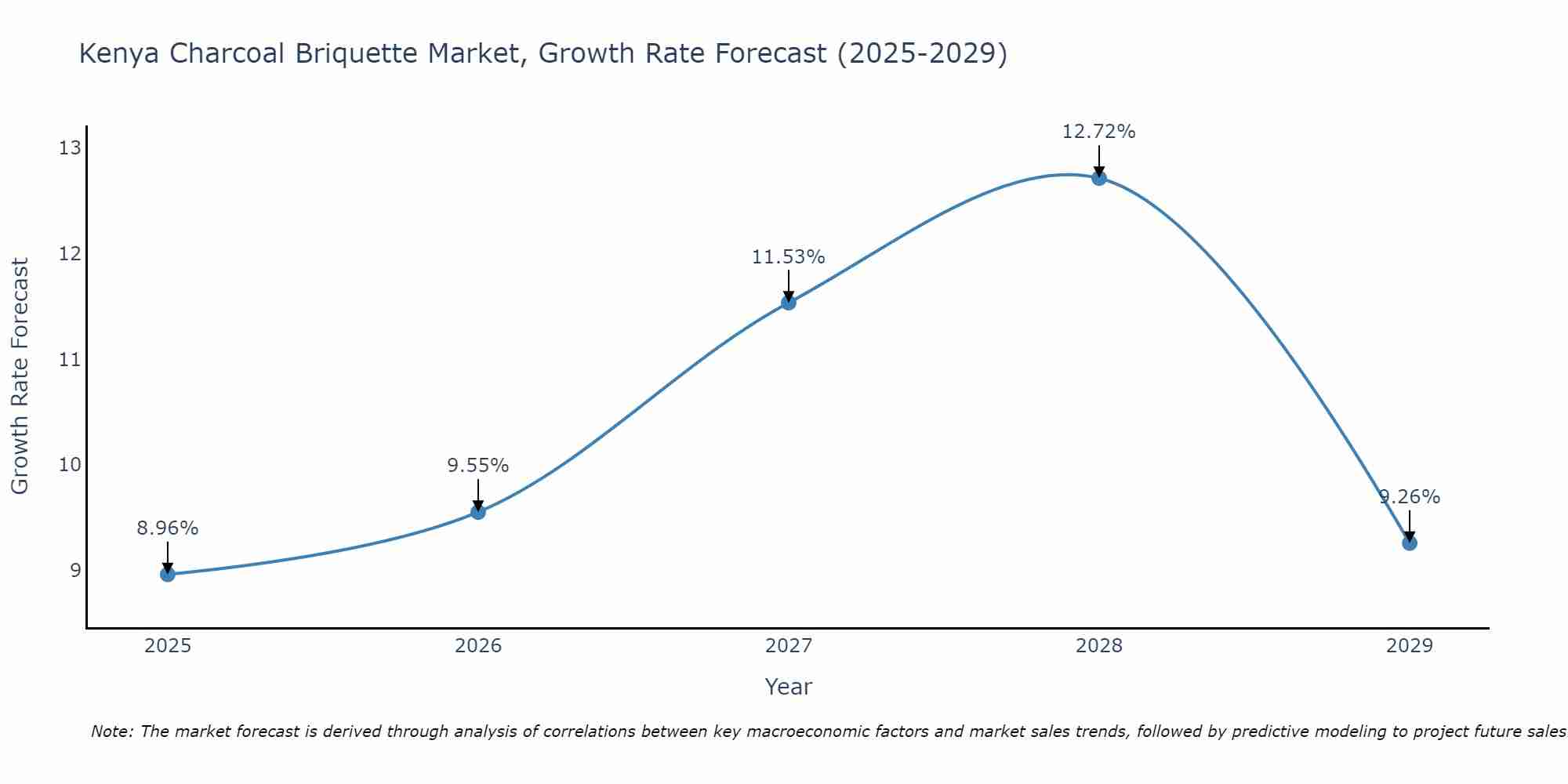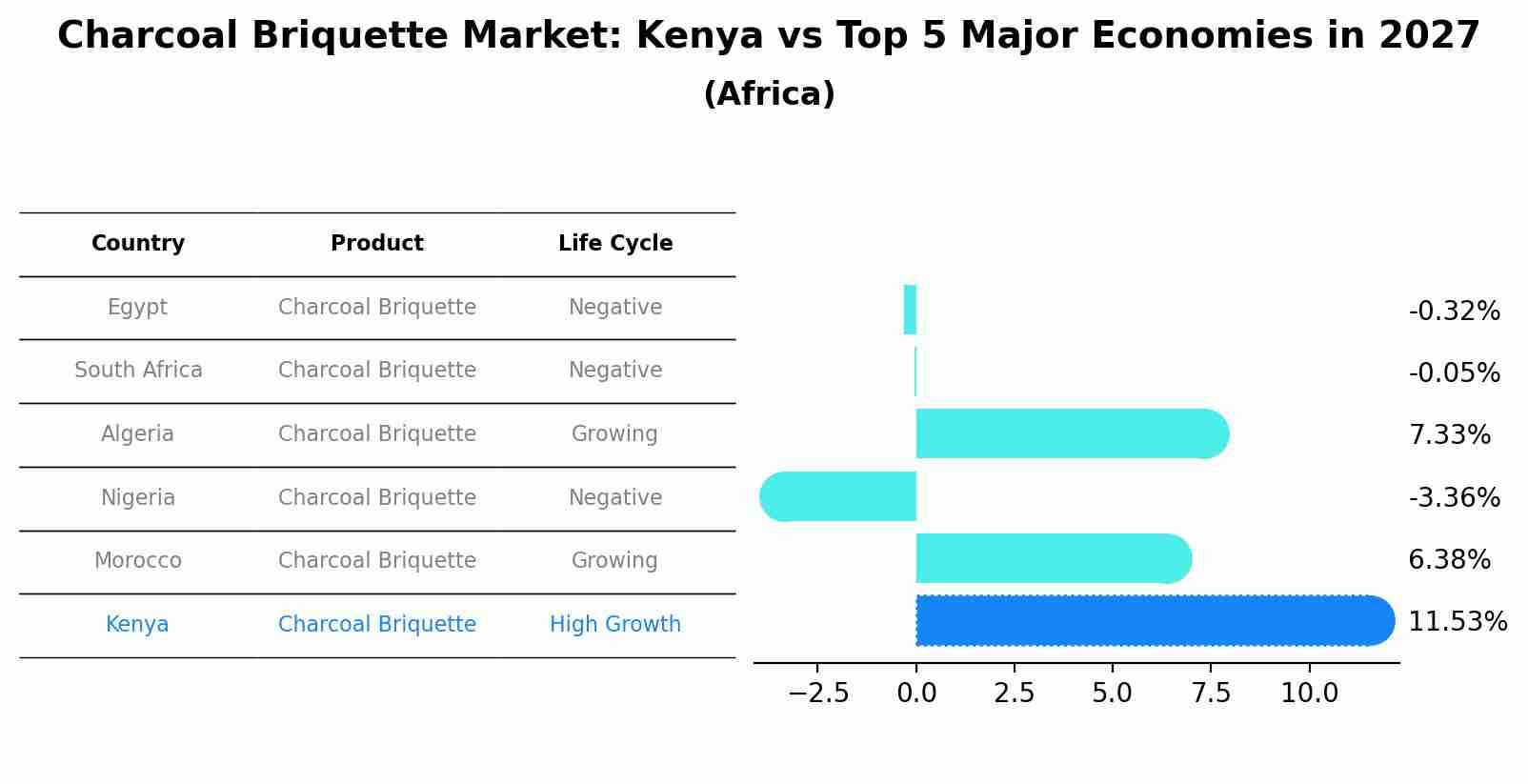Kenya Charcoal Briquette Market Outlook | Revenue, Companies, Analysis, Trends, Value, COVID-19 IMPACT, Growth, Share, Industry, Forecast & Size
| Product Code: ETC286550 | Publication Date: Aug 2022 | Updated Date: Jul 2025 | Product Type: Market Research Report | |
| Publisher: 6Wresearch | Author: Bhawna Singh | No. of Pages: 75 | No. of Figures: 35 | No. of Tables: 20 |
Kenya Charcoal Briquette Market Size Growth Rate
The Kenya Charcoal Briquette Market is projected to witness mixed growth rate patterns during 2025 to 2029. The growth rate begins at 8.96% in 2025, climbs to a high of 12.72% in 2028, and moderates to 9.26% by 2029.

Charcoal Briquette Market: Kenya vs Top 5 Major Economies in 2027 (Africa)
By 2027, Kenya's Charcoal Briquette market is forecasted to achieve a high growth rate of 11.53%, with Egypt leading the Africa region, followed by South Africa, Algeria, Nigeria and Morocco.

Kenya Charcoal Briquette Market Overview
The Kenya charcoal briquette market has been experiencing significant growth in recent years due to increasing awareness of environmental issues and the need for sustainable energy sources. Charcoal briquettes are becoming a popular alternative to traditional charcoal made from wood, as they are more efficient, cleaner, and produced from renewable biomass sources such as agricultural waste and sawdust. The market is driven by factors such as the rising demand for clean cooking solutions, government initiatives promoting sustainable energy, and the growth of the urban population. Key players in the market are focusing on product innovation, quality control, and distribution strategies to meet the growing demand. Overall, the Kenya charcoal briquette market is poised for continued expansion as consumers seek eco-friendly and affordable fuel options.
Kenya Charcoal Briquette Market Trends
In the Kenya Charcoal Briquette Market, there is a growing trend towards sustainable and eco-friendly products due to increasing environmental awareness and concerns about deforestation. Consumers are increasingly seeking charcoal briquettes made from recycled materials or from sustainably sourced biomass to reduce carbon emissions and preserve forests. Additionally, there is a rising demand for cleaner and more efficient cooking fuel alternatives, driving the popularity of charcoal briquettes as a cleaner and cost-effective option compared to traditional charcoal or firewood. Market players are also focusing on innovation in product design and packaging to attract environmentally-conscious consumers. Overall, the Kenya Charcoal Briquette Market is experiencing a shift towards sustainability and eco-conscious choices to meet the evolving preferences of consumers.
Kenya Charcoal Briquette Market Challenges
In the Kenya charcoal briquette market, challenges include competition from traditional charcoal sellers, lack of awareness among consumers regarding the benefits of using charcoal briquettes as a sustainable and eco-friendly alternative, inconsistent quality of briquettes leading to doubts about their efficiency, and limited access to distribution channels for small-scale producers. Additionally, high production costs, inadequate financing options for small businesses, and limited technical know-how among producers also hinder the growth of the market. Overcoming these challenges will require increased education and awareness campaigns, support for quality control measures, fostering partnerships with distribution networks, and providing training and financial assistance to small-scale producers to improve their production processes and scale their businesses effectively.
Kenya Charcoal Briquette Market Investment Opportunities
The Kenya charcoal briquette market presents promising investment opportunities due to the increasing demand for sustainable and clean cooking fuel alternatives. With the rising awareness of environmental sustainability and the need to reduce deforestation, charcoal briquettes have gained popularity as an eco-friendly and cost-effective solution. Investors can capitalize on this trend by entering the market through production facilities, distribution networks, or technology innovations to improve the efficiency and quality of charcoal briquettes. Additionally, partnerships with local communities and organizations can help ensure a sustainable and ethical supply chain. Overall, investing in the Kenya charcoal briquette market offers the potential for significant growth and positive impact on both the environment and the local economy.
Kenya Charcoal Briquette Market Government Policy
The Kenyan government has implemented various policies to support the growth of the charcoal briquette market as part of its sustainable energy initiatives. These policies include tax incentives and subsidies for producers using sustainable practices, as well as regulations aimed at curbing deforestation and promoting the use of renewable energy sources. Additionally, the government has launched awareness campaigns to educate consumers about the benefits of using charcoal briquettes over traditional charcoal, emphasizing their environmental friendliness and cost-effectiveness. These policies are intended to drive the adoption of charcoal briquettes as an alternative fuel source, reduce pressure on forests, and mitigate the harmful environmental impact of traditional charcoal production and consumption in Kenya.
Kenya Charcoal Briquette Market Future Outlook
The future outlook for the Kenya Charcoal Briquette Market appears positive, driven by increasing awareness of the environmental and health benefits of using charcoal briquettes over traditional charcoal. The government`s efforts to promote sustainable energy sources and combat deforestation are likely to further boost the market. Additionally, the rising demand for clean cooking solutions in both urban and rural areas is expected to drive the adoption of charcoal briquettes. Innovation in production techniques and marketing strategies, as well as the growing availability of affordable raw materials, are set to contribute to market growth. Overall, the Kenya Charcoal Briquette Market is poised for expansion as consumers increasingly prioritize sustainable and efficient energy solutions.
Key Highlights of the Report:
- Kenya Charcoal Briquette Market Outlook
- Market Size of Kenya Charcoal Briquette Market, 2021
- Forecast of Kenya Charcoal Briquette Market, 2031
- Historical Data and Forecast of Kenya Charcoal Briquette Revenues & Volume for the Period 2018 - 2031
- Kenya Charcoal Briquette Market Trend Evolution
- Kenya Charcoal Briquette Market Drivers and Challenges
- Kenya Charcoal Briquette Price Trends
- Kenya Charcoal Briquette Porter's Five Forces
- Kenya Charcoal Briquette Industry Life Cycle
- Historical Data and Forecast of Kenya Charcoal Briquette Market Revenues & Volume By Type for the Period 2018 - 2031
- Historical Data and Forecast of Kenya Charcoal Briquette Market Revenues & Volume By Wood Type for the Period 2018 - 2031
- Historical Data and Forecast of Kenya Charcoal Briquette Market Revenues & Volume By Others for the Period 2018 - 2031
- Historical Data and Forecast of Kenya Charcoal Briquette Market Revenues & Volume By Application for the Period 2018 - 2031
- Historical Data and Forecast of Kenya Charcoal Briquette Market Revenues & Volume By Metallurgical Industry for the Period 2018 - 2031
- Historical Data and Forecast of Kenya Charcoal Briquette Market Revenues & Volume By BBQ for the Period 2018 - 2031
- Historical Data and Forecast of Kenya Charcoal Briquette Market Revenues & Volume By Others for the Period 2018 - 2031
- Kenya Charcoal Briquette Import Export Trade Statistics
- Market Opportunity Assessment By Type
- Market Opportunity Assessment By Application
- Kenya Charcoal Briquette Top Companies Market Share
- Kenya Charcoal Briquette Competitive Benchmarking By Technical and Operational Parameters
- Kenya Charcoal Briquette Company Profiles
- Kenya Charcoal Briquette Key Strategic Recommendations
Frequently Asked Questions About the Market Study (FAQs):
- Single User License$ 1,995
- Department License$ 2,400
- Site License$ 3,120
- Global License$ 3,795
Search
Thought Leadership and Analyst Meet
Our Clients
Related Reports
- Canada Oil and Gas Market (2026-2032) | Share, Segmentation, Value, Industry, Trends, Forecast, Analysis, Size & Revenue, Growth, Competitive Landscape, Outlook, Companies
- Germany Breakfast Food Market (2026-2032) | Industry, Share, Growth, Size, Companies, Value, Analysis, Revenue, Trends, Forecast & Outlook
- Australia Briquette Market (2025-2031) | Growth, Size, Revenue, Forecast, Analysis, Trends, Value, Share, Industry & Companies
- Vietnam System Integrator Market (2025-2031) | Size, Companies, Analysis, Industry, Value, Forecast, Growth, Trends, Revenue & Share
- ASEAN and Thailand Brain Health Supplements Market (2025-2031) | Strategy, Consumer Insights, Analysis, Investment Trends, Opportunities, Growth, Size, Share, Industry, Revenue, Segments, Value, Segmentation, Supply, Forecast, Restraints, Outlook, Competition, Drivers, Trends, Demand, Pricing Analysis, Competitive, Strategic Insights, Companies, Challenges
- ASEAN Bearings Market (2025-2031) | Strategy, Consumer Insights, Analysis, Investment Trends, Opportunities, Growth, Size, Share, Industry, Revenue, Segments, Value, Segmentation, Supply, Forecast, Restraints, Outlook, Competition, Drivers, Trends, Demand, Pricing Analysis, Competitive, Strategic Insights, Companies, Challenges
- Europe Flooring Market (2025-2031) | Outlook, Share, Industry, Trends, Forecast, Companies, Revenue, Size, Analysis, Growth & Value
- Saudi Arabia Manlift Market (2025-2031) | Outlook, Size, Growth, Trends, Companies, Industry, Revenue, Value, Share, Forecast & Analysis
- Uganda Excavator, Crane, and Wheel Loaders Market (2025-2031) | Strategy, Consumer Insights, Analysis, Investment Trends, Opportunities, Growth, Size, Share, Industry, Revenue, Segments, Value, Segmentation, Supply, Forecast, Restraints, Outlook, Competition, Drivers, Trends, Demand, Pricing Analysis, Competitive, Strategic Insights, Companies, Challenges
- Rwanda Excavator, Crane, and Wheel Loaders Market (2025-2031) | Strategy, Consumer Insights, Analysis, Investment Trends, Opportunities, Growth, Size, Share, Industry, Revenue, Segments, Value, Segmentation, Supply, Forecast, Restraints, Outlook, Competition, Drivers, Trends, Demand, Pricing Analysis, Competitive, Strategic Insights, Companies, Challenges
Industry Events and Analyst Meet
Whitepaper
- Middle East & Africa Commercial Security Market Click here to view more.
- Middle East & Africa Fire Safety Systems & Equipment Market Click here to view more.
- GCC Drone Market Click here to view more.
- Middle East Lighting Fixture Market Click here to view more.
- GCC Physical & Perimeter Security Market Click here to view more.
6WResearch In News
- Doha a strategic location for EV manufacturing hub: IPA Qatar
- Demand for luxury TVs surging in the GCC, says Samsung
- Empowering Growth: The Thriving Journey of Bangladesh’s Cable Industry
- Demand for luxury TVs surging in the GCC, says Samsung
- Video call with a traditional healer? Once unthinkable, it’s now common in South Africa
- Intelligent Buildings To Smooth GCC’s Path To Net Zero


















